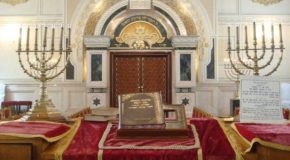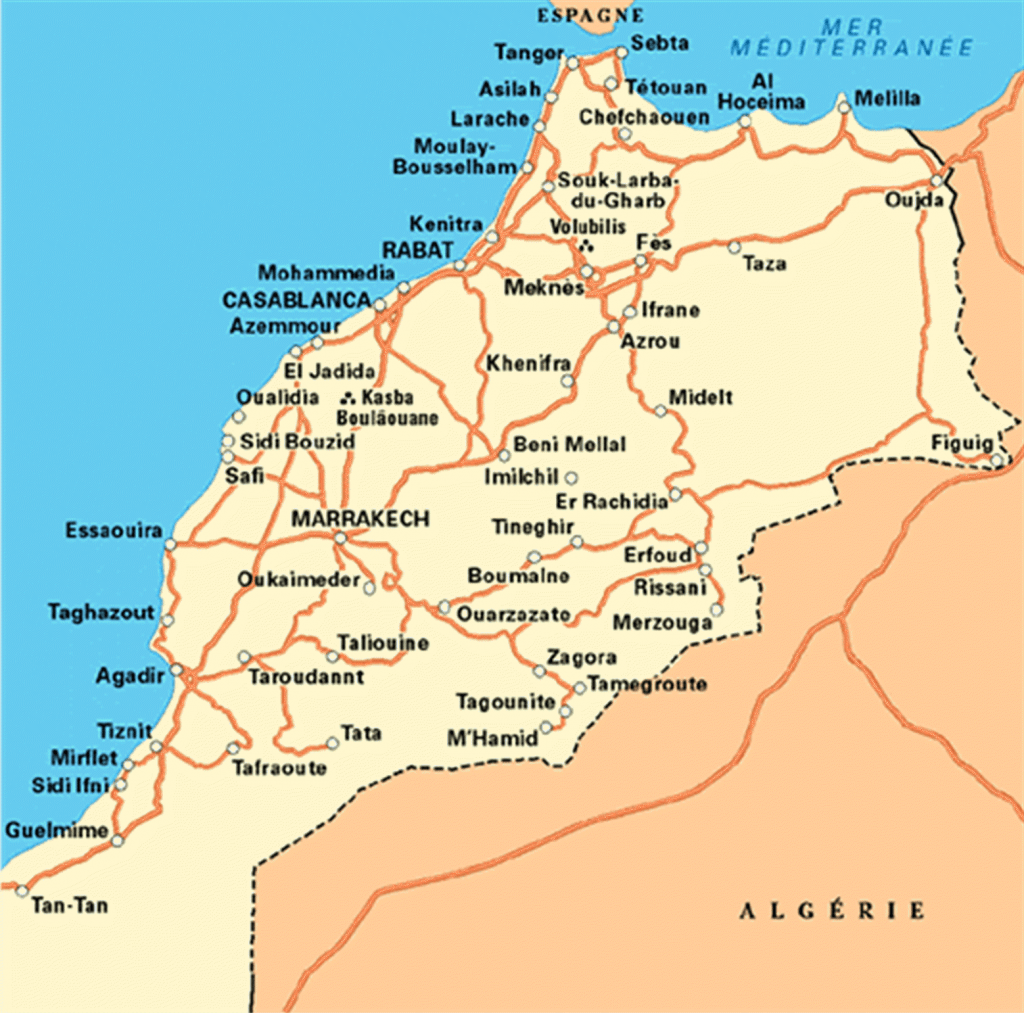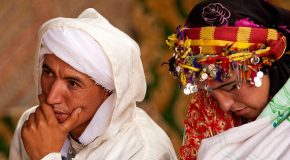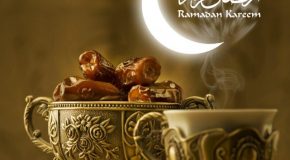
To Organize a trip in Morocco
Travel in Morocco: how you have to Know

To Organize a trip in Morocco
Morocco, land of colors, strong flavors and breathtaking landscapes. A country that is often heard and little known about… or maybe not?!
Morocco – which takes its name from the city of Marrakech (in tamazight – Berber language – means Land of God) is a constitutional monarchy, part of the countries of North Africa, better identified as Maghreb countries.
It is a country whose population is partly Arabic and for the most part Berber, two different cultures that coexist with different traditions, and offers various possibilities: from the journey centred on Arab history and architecture, to spectacular natural landscapes (mountains, valleys, the Desert…), various sports activities, not least aquatic.
Choosing Morocco for the sea is perhaps the only option not recommended, because the Atlantic – which touches the most part of the territory – does not suit the pleasure of lying down on a sunbed and spreading in the sun, yet still offers unforgettable landscapes and sunsets.
The present article does not claim to exhaust and deepen all the arguments, for that there are paper guides and they certainly do it better than us, but it can be a useful track for those who are preparing to organize a trip, solving some doubts.
It is intentionally written in a colloquial form, to explain more simply the experience of a trip to Morocco and is the result of the personal knowledge of our staff who are native to Morocco and live in Morocco and of our Italian friend who has so many times crossed the land of our country and whom we thank heartily.
CHAPTERS
- ENTRY DOCUMENTS
- WHEN TO GO: WHAT CLIMATE DO YOU FIND?
- VACCINATIONS AND HEALTH
- CURRENCY AND PAYMENTS
- WHERE TO SLEEP: TYPE OF HOTEL
- LOCAL TIME
- THE CULINARY PROPOSAL
- PHONE CALL, MESSAGING, STAY CONNECTED WITH THE WORLD
- HOW TO PLAN A TRIP
- SECURITY
- WOMEN TRAVELLING ALONE
- SUGGESTED CLOTHING
- TRAVEL SHOPPING
- TRAVELLING DURING THE RAMADAN
Entry documents
To enter in Morocco, is required a valid passport when leaving the country.
On arrival in Morocco, together with the passport, you must present the landing card. Normally it is distributed in flight otherwise, you will find it in the airport area, before passport control.
Keep at hand the name of the hotel where you will stay for the first night because it will be indicated on the landing card.
An entry number will be indicated on the passport, which authorities will re-use every time you return to the country.
For reasons of tourism it is possible to stay for up to 90 consecutive days, then it is required to leave the Moroccan territory. It is possible to return anyway.
When to go: What climate will I find?
First point: the climate has also changed a lot in Morocco, rainfall and snowfalls are more frequent, at least in recent years, which changes what is known as climate information.
The general line we can say that Morocco is also characterized by the 4 seasons but, unlike Europe, temperatures are generally milder.
You can arrive at Christmas and find a nice warm sun (not 30°) but undergo an important night temperature range, as well as get to February is normally cold.
Remaining therefore on the “general line” (the modern apps allow you to verify the temperature in real time and, except for the deviation of a few degrees, will correspond to reality):
In winter, if it snows a lot on the Atlas, temperatures generally suffer. Milder are the seaside resorts and colder inland ones (see Marrakech, Fes, the Desert, for example).
In spring there may be episodes of sand storm, it can be very hot as not, in general it is advisable to wear a garment that protects from the cold in case of temperature change.
Summer is very hot, July is the most challenging month and – normally – temperatures reach and exceed 40 degrees Celsius. It is not unlikely to reach up to 50°. It’s a dry climate, but undoubtedly visiting a city with these temperatures is not healthy. It is always preferable to go out at lower temperatures. In any case, tourists from all over the world – using devices to face the heat – travel also in July and August.
The same suggestions apply to autumn as spring.
In which period it is preferable to travel, depending on the type of route chosen, but always in general, the best periods are spring and autumn.
If you can’t choose, any other time will be fine, just adapt to the climate.
Vaccinations and Health
There are no endemic diseases for which compulsory vaccination is required in Morocco.
Underwriting travel insurance cover is suggested because in Morocco the Healthcare is paid and also quite expensive.
Pharmacies are present in a capillary way however, it is suggested to have with them emergency remedies such as: paracetamol for fever, an antibiotic for the stomach, lactic ferments.
The most frequent disorders are related to food, due to the presence of many spices and heat shots (wear a hat or turban is recommended).
It is also important to protect your eyes with sunglasses because of the bright light.
ON 2021 COVID NEGATIV TEST IS REQUIRED: 72 hours before your flight
Coin / Payments
The current currency is dirham (mad) whose countervalue with respect to the euro is about 11 (March 2018 ); to simplify, 100 mad are about 10 euros.
The local currency can be purchased in Morocco (in the airport or in the city) and cannot be transported abroad (surely there is tolerance in case you keep small cuts for memory).
In Morocco you can use credit cards, but it is not so usual to pay with this system; it is therefore preferable to change for small purchases (a coffee, a tea, water, leave tips, personal purchases, etc.). The euro is accepted everywhere, except in supermarkets where it is obligatory to pay in local currency, as well as public services.
Where to sleep: type of Hotel
The offer in Morocco is varied: from extra luxury hotels (see for example the Mamounia in Marrakech) to budget hotels and hostels.
The most authentic structure is the Riad; similar to the Riad are the Maison d’ Hotes (“guest houses”). These structures are generally located inside the Medina: they are built with traditional materials, and have the facade towards the alleys and inside the patio overlooking the guest rooms.
There is no lack of offers in apartment, in large cities; different speech in rural areas where this culture is not widespread.
Camping areas are available for camper van travellers.
Non-Muslim tourists are not subject to any kind of restriction. Different when a Muslim couple is present inside the couple, in this case it is compulsory to show the marriage certificate.
Recommendation: In Morocco, homosexuality is considered a criminal offence and it is therefore recommended to avoid public outpouring (undesirable acts even among heterosexual couples).
Time Zone
Before your trip, check the “time zone“. During the Ramadan period, summer time is suspended in order to be able to anticipate the stop at the fast.
The culinary proposal
Moroccan cuisine is quite varied: from tajine (vegetables, meat, fish) to couscous (typical Friday dish); meat (very famous the skewers – called brochettes), fish, especially along the Atlantic coast. There is a wide range of dishes with potatoes and omelettes. A wide range of sweets (on all almond paste, dates). In short, there is only the embarrassment of choice.
Eating is quite cheap, always pay attention to hygiene. In Jemaa el Fna Square in Marrakech, you can enjoy your meals at banquets.
Moderate the consumption of Moroccan salads (you can’t know with what kind of water the salad has been washed) and in general raw food, fruit consumption (as in all hot countries) and the consumption of ice drinks.
Mint tea is really special, but make a morigrated use of it.
It’s easy for vegetarians to follow the diet, just order a tajine of vegetables; for vegans a little more complex, because it’s a poor country, where eating 3 meals per day is not a foregone conclusion for everyone, it doesn’t really understand the need to eliminate food from your diet; you can opt for a vegetarian diet. For those who have problems with coeliac disease and food intolerance, it is advisable to inform the hotel in advance. Kosher cuisine is difficult to find throughout the territory, only in some cities (we are able to organize tours that include this type of cuisine).
Telephoning, messaging, stay connected with the world
Communications to and from Morocco are quite simple even if expensive; check with your operator the cost of calls (they are quite high, both in reception and outgoing); buying a local SIM can be a solution but not particularly cheap.
WI-FI connections are quite widespread, communicating via whatsapp will be the simplest method (for those who use this type of application).
How to organize a trip
Morocco is a relatively easy country to visit, much depends on one’s personal attitudes and time.
The itineraries are mainly affected by some elements:
- The duration of the journey
- Transfer with car, or bus or train
- Arrival and departure airports in Morocco
For those who want to rely on a local agent – tailor-made trip
Choosing a local agent certainly involves a higher expense than group travel, but it offers the possibility to personalize your travel in every detail: from the day of arrival to the day of departure, from the airport of arrival to the airport of departure; the possibility to study an itinerary suited to your desires; have freedom of movement; being able to establish a closer relationship with your driver who will be the repository of all your questions about culture and the country and will answer using your language. Choice of type of accommodation facility and many others
Security
We report what is written in our article dedicated to the topic:
In these difficult years, when the problems at global level make themselves felt and weigh on tourism, European travellers (sometimes) ask us what situation they will encounter in Morocco.
Given that none of us possesses the crystal ball and on the security issue, not even experts in the sector are able to provide unambiguous information, what we can assure you is that at the moment, Morocco – thanks to the initiatives taken at the will of our King Mohamed VI “- has raised the level of security, as well as most of the European states with which Morocco has been working for a long time.
In March 2015 B. C. I. J. B. was established the Bureau Central d’ Investigations Judiciaires, a special force in the fight against terrorism, to guarantee the safety of Moroccan citizens and the millions of tourists (over 10,000,000) who every year choose Morocco for their holidays.
The presence of security forces is tangible and controls are carried out with great care, especially in places characterized by important assemblies (Aeroports, train and bus stations, tourist sites, etc.).
Having said that, life in Morocco is peaceful and requires no special precautions, neither from the point of view of safety nor from the point of view of the health situation.
We all hope that this state of serenity will last forever!
Women travelling alone
A separate chapter is dedicated to the many women who wish to travel alone: feel to travel freely. Yes, we know that some of our fellow countrymen know how heavy, pedantic, annoy you with a thousand compliments, but we are not all equal. Most of us know how to stay there!
In the big cities, they will try to accompany you to sell something or get a tip for being your guide. In the meantime, be wary of these “guides” because the authorization to accompany tourists is held exclusively by those who have obtained the local driving license of a specific location. Steps in small towns where the control of formalities is almost non-existent, but in large cities, it is always advisable to use some precautions.
You pretend you don’t understand any language, don’t answer anyone and you won’t get annoyed. Cities are manned everywhere. Of course, Morocco is not the land of the Balocchi and you have to use the same caution you use when you are at home.
Suggested clothing
A very small evaluation of clothing: given that Morocco is a so-called “moderate” Muslim country, there are no obligations in terms of clothing however, it is suggested to avoid succinct clothing, because most women – especially within the country – are veiled from head to toe and a misery too much discovered could recall the glances of the population. This is a suggestion, not an obligation.
Travel Shopping
On this subject we could spend pages of suggestions: let’s try to summarise the products for which it is worth spending a few euros:
- Beauty: first of all argan oil, to be bought preferably from a cooperative that guarantees its quality. It is a rather expensive product because of the complexity of cultivation and processing to obtain the product.
- The black soap, accompanied by the glove, extraordinary for the srub. The soap is made from olive oil and therefore has a rather intense smell. The cost is very happy.
- If you visit the Valle delle Rose, it is a must to purchase rose-based products, particularly renowned in the region.
- Leather products: must-have the babbucce, present everywhere, but in the Suq of Marrakech you will find a pavilion completely dedicated. Bags, wallets, belts made entirely of leather. Yes the smell is strong, invariably, but they are very attractive.
- Lamps, ceramics, pottery, terracotta, teapots, glasses, mirrors: the lamps are very fascinating: at night, when traders turn on all the lamps, immediately and magic! Household objects made of ceramic, completely handmade. The terracotta of the tajinas, to try to repeat the dish once back home. And still the inevitable teapots and tea glasses. Mirrors of beautiful workmanship.
- Jewelry: if you are not profound connoisseurs, give up the purchase. Same attention to antiques.
- How to resist carpets? Many traders are organized for the shipment of your carpet directly to your destination.
- If you visit the Desert, don’t miss the turban: there are colorful ones and once at home, you can reuse them in the form of a scarf.
Travelling during Ramadan
means taking into account some inconvenience, not insurmountable:
- Early closure of monumental structures
- Closing of some tourist establishments, including tourist establishments
- The short hours of many services
- During the day the cities are semi-desert; the families leave only after sunset, after dinner
Tourism staff may not be at the top of their shape, because all physical rhythms are slowed down due to the total abstention from eating and drinking, from dawn to dusk.
Travelling during Ramadan, is a unique opportunity to enter the heart of Muslim culture, this must certainly be said, but it is important to become aware that this is an exceptional period, with all the consequences that this entails.
Book your trip in time.
Utilizzando questo sito web si acconsente all'utilizzo di cookies in conformità alla nostra politica sui cookies Ok

